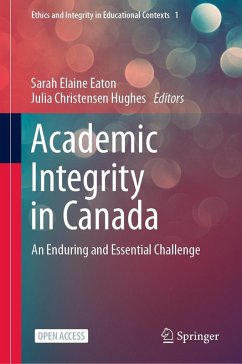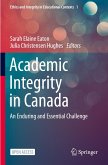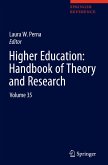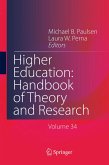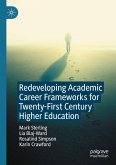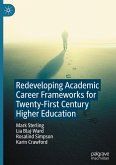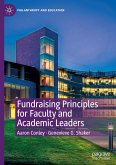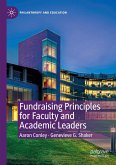Academic Integrity in Canada
An Enduring and Essential Challenge
Herausgegeben:Eaton, Sarah Elaine; Christensen Hughes, Julia
Academic Integrity in Canada
An Enduring and Essential Challenge
Herausgegeben:Eaton, Sarah Elaine; Christensen Hughes, Julia
- Gebundenes Buch
- Merkliste
- Auf die Merkliste
- Bewerten Bewerten
- Teilen
- Produkt teilen
- Produkterinnerung
- Produkterinnerung
This open access book presents original contributions and thought leadership on academic integrity from a variety of Canadian scholars. It showcases how our understanding and support for academic integrity have progressed, while pointing out areas urgently requiring more attention. Firmly grounded in the scholarly literature globally, it engages with the experience of local practicioners. It presents aspects of academic integrity that is specific to Canada, such as the existence of an "honour culture", rather than relying on an "honour code". It also includes Indigenous voices and perspectives…mehr
Andere Kunden interessierten sich auch für
![Academic Integrity in Canada Academic Integrity in Canada]() Academic Integrity in Canada33,99 €
Academic Integrity in Canada33,99 €![Higher Education: Handbook of Theory and Research Higher Education: Handbook of Theory and Research]() Higher Education: Handbook of Theory and Research217,99 €
Higher Education: Handbook of Theory and Research217,99 €![Higher Education: Handbook of Theory and Research Higher Education: Handbook of Theory and Research]() Higher Education: Handbook of Theory and Research155,99 €
Higher Education: Handbook of Theory and Research155,99 €![Redeveloping Academic Career Frameworks for Twenty-First Century Higher Education Redeveloping Academic Career Frameworks for Twenty-First Century Higher Education]() Mark SterlingRedeveloping Academic Career Frameworks for Twenty-First Century Higher Education93,99 €
Mark SterlingRedeveloping Academic Career Frameworks for Twenty-First Century Higher Education93,99 €![Redeveloping Academic Career Frameworks for Twenty-First Century Higher Education Redeveloping Academic Career Frameworks for Twenty-First Century Higher Education]() Mark SterlingRedeveloping Academic Career Frameworks for Twenty-First Century Higher Education93,99 €
Mark SterlingRedeveloping Academic Career Frameworks for Twenty-First Century Higher Education93,99 €![Fundraising Principles for Faculty and Academic Leaders Fundraising Principles for Faculty and Academic Leaders]() Aaron ConleyFundraising Principles for Faculty and Academic Leaders54,99 €
Aaron ConleyFundraising Principles for Faculty and Academic Leaders54,99 €![Fundraising Principles for Faculty and Academic Leaders Fundraising Principles for Faculty and Academic Leaders]() Aaron ConleyFundraising Principles for Faculty and Academic Leaders20,99 €
Aaron ConleyFundraising Principles for Faculty and Academic Leaders20,99 €-
-
-
This open access book presents original contributions and thought leadership on academic integrity from a variety of Canadian scholars. It showcases how our understanding and support for academic integrity have progressed, while pointing out areas urgently requiring more attention.
Firmly grounded in the scholarly literature globally, it engages with the experience of local practicioners. It presents aspects of academic integrity that is specific to Canada, such as the existence of an "honour culture", rather than relying on an "honour code". It also includes Indigenous voices and perspectives that challenge traditional understandings of intellectual property, as well as new understandings that have arisen as a consequence of Covid-19 and the significant shift to online and remote learning.
This book will be of interest to senior university and college administrators who are interested in ensuring the integrity of their institutions. It will also be of interest to those implementing university and college policy, as well as those who support students in their scholarly work.
Firmly grounded in the scholarly literature globally, it engages with the experience of local practicioners. It presents aspects of academic integrity that is specific to Canada, such as the existence of an "honour culture", rather than relying on an "honour code". It also includes Indigenous voices and perspectives that challenge traditional understandings of intellectual property, as well as new understandings that have arisen as a consequence of Covid-19 and the significant shift to online and remote learning.
This book will be of interest to senior university and college administrators who are interested in ensuring the integrity of their institutions. It will also be of interest to those implementing university and college policy, as well as those who support students in their scholarly work.
Produktdetails
- Produktdetails
- Ethics and Integrity in Educational Contexts 1
- Verlag: Springer / Springer International Publishing / Springer, Berlin / University of Guelph
- Artikelnr. des Verlages: 978-3-030-83254-4
- 1st ed. 2022
- Seitenzahl: 632
- Erscheinungstermin: 4. März 2022
- Englisch
- Abmessung: 241mm x 160mm x 40mm
- Gewicht: 1103g
- ISBN-13: 9783030832544
- ISBN-10: 3030832546
- Artikelnr.: 62166654
- Herstellerkennzeichnung Die Herstellerinformationen sind derzeit nicht verfügbar.
- Ethics and Integrity in Educational Contexts 1
- Verlag: Springer / Springer International Publishing / Springer, Berlin / University of Guelph
- Artikelnr. des Verlages: 978-3-030-83254-4
- 1st ed. 2022
- Seitenzahl: 632
- Erscheinungstermin: 4. März 2022
- Englisch
- Abmessung: 241mm x 160mm x 40mm
- Gewicht: 1103g
- ISBN-13: 9783030832544
- ISBN-10: 3030832546
- Artikelnr.: 62166654
- Herstellerkennzeichnung Die Herstellerinformationen sind derzeit nicht verfügbar.
Sarah Elaine Eaton, PhD, is the Educational Leader in Residence and a full-time faculty member at the University of Calgary, Canada. In March 2020, she was promoted to the rank of Associate Professor, effective July 1, 2020. She is the Co-Editor-in-Chief of the International Journal of Educational Integrity and the co-founder and co-editor of Canadian Perspectives on Academic Integrity. She has served as the Program Chair for the 2020 International Centre for Academic Integrity Conference and was the Co-Chair of the 2019 Canadian Symposium on Academic Integrity, which was the first symposium of its kind in Canadian higher education. Eaton was the 2015 recipient of the Teaching Excellence Award from the Werklund School of Education, University of Calgary. She has also been nominated for teaching excellence and educational leadership awards at the institutional and national levels. In 2016, she was honoured to be invited the sole Canadian representative at an exclusive education event held at the White House, Washington, D.C., where she engaged in dialogue with educators, diplomats and thought leaders about educational diplomacy and democracy. Dr. Julia Christensen hughes has been on faculty at the University of Guelph, in Ontario, Canada since 1987, recently serving as founding dean of the Gordon S. Lang School of Business and Economics (2009-2019). She championed the concept of "business as a force for good" and purpose-driven, ethical enterprise. She teaches incoming BComm students to apply philosophical frameworks to complex real-world ethical dilemmas. In recognition of these efforts, Julia was invited to address the United Nations General Assemby on the need for business school so embrace Princples of Responsible Management Education (PRME).
Section I: Understanding the big picture of academic integrity in Canada: An Enduring Challenge.- Section introduction: Understanding the big picture of academic integrity in Canada.- Academic integrity in Canada: A historical perspective and current trends.- Integrity violations in the academy: A decade of growing complexity and concern (2010-2020).- Confronting COVID-19: What the pandemic taught us about academic integrity.- Academic integrity through a SoTL Lens and 4M Framework: An institutional self-study.- An administrator's perspectives of the academic misconduct ecosystem: recommendations for resolving multi-stakeholder differences.- Re-defining academic Integrity with Indigenous truths.- Accountability, relationality and Indigenous epistemology: Advancing an Indigenous perspective on academic integrity.- Understanding provincial and territorial academic integrity policies for elementary and secondary education in Canada.- Section II: Understanding academic integrity in specific contexts.- Section introduction: Understanding academic integrity in specific contexts.- Academic integrity in Canadian engineering schools.- Teaching the teachers: Do preservice teachers plagiarise?.- Visual plagiarism: Seeing the forest and the trees.- The distinctive nature of academic integrity in graduate legal education.- Perceptions and experiences in understanding academic integrity: Reflections within a doctoral program.- The barriers to reporting incidences of academic dishonesty: The unique perspective of faculty from Canadian community colleges.- Promotion of academic integrity through a marketing lens for Canadian post-secondary institutions.- Academic integrity in the practice / service learning setting.- Promoting academic integrity and preventing misconduct in a Canadian open digital distance education university.- Section III: An urgent and growing problem: Contract cheating in Canada.- Section introduction: Contract cheating in Canada.- Ethics, ed tech, and therise of contract cheating.- Pay-to-pass: Knowledge as a commodity in the digital age.- Education as a financial transaction: Contract employment and contract cheating.- Committing and facilitating academic misconduct as white-collar and corporate crime.- Section IV: Essential strategies and levers to advance academic integrity.- Section introduction: Essential strategies and levers to advance academic integrity.- Using quality assurance frameworks to support an institutional culture of academic integrity at Canadian universities.- Beyond the traditional: Academic integrity advocacy in Canadian librarianship.- Using computer-facilitated focus groups to gather student insight on academic integrity.- Fostering academic integrity through curriculum design.- Threading the needle: Student advocacy offices and their role within academic integrity.- Helping students resolve the ambiguous expectations of academic integrity.- How to talk about academic integrity, so students will listen: The inherent challenge in "mandated" training.- Revisioning instructor-writing specialist collaboration for paraphrasing instruction.- Supporting academic integrity in the writing centre: Student consultant perspectives.- Cultural aspects of academic integrity.- A new framework for enhancing (academic) integrity.- Building a culture of restorative practice and restorative responses to academic misconduct.
Section I: Understanding the big picture of academic integrity in Canada: An Enduring Challenge.- Section introduction: Understanding the big picture of academic integrity in Canada.- Academic integrity in Canada: A historical perspective and current trends.- Integrity violations in the academy: A decade of growing complexity and concern (2010-2020).- Confronting COVID-19: What the pandemic taught us about academic integrity.- Academic integrity through a SoTL Lens and 4M Framework: An institutional self-study.- An administrator's perspectives of the academic misconduct ecosystem: recommendations for resolving multi-stakeholder differences.- Re-defining academic Integrity with Indigenous truths.- Accountability, relationality and Indigenous epistemology: Advancing an Indigenous perspective on academic integrity.- Understanding provincial and territorial academic integrity policies for elementary and secondary education in Canada.- Section II: Understanding academic integrity in specific contexts.- Section introduction: Understanding academic integrity in specific contexts.- Academic integrity in Canadian engineering schools.- Teaching the teachers: Do preservice teachers plagiarise?.- Visual plagiarism: Seeing the forest and the trees.- The distinctive nature of academic integrity in graduate legal education.- Perceptions and experiences in understanding academic integrity: Reflections within a doctoral program.- The barriers to reporting incidences of academic dishonesty: The unique perspective of faculty from Canadian community colleges.- Promotion of academic integrity through a marketing lens for Canadian post-secondary institutions.- Academic integrity in the practice / service learning setting.- Promoting academic integrity and preventing misconduct in a Canadian open digital distance education university.- Section III: An urgent and growing problem: Contract cheating in Canada.- Section introduction: Contract cheating in Canada.- Ethics, ed tech, and therise of contract cheating.- Pay-to-pass: Knowledge as a commodity in the digital age.- Education as a financial transaction: Contract employment and contract cheating.- Committing and facilitating academic misconduct as white-collar and corporate crime.- Section IV: Essential strategies and levers to advance academic integrity.- Section introduction: Essential strategies and levers to advance academic integrity.- Using quality assurance frameworks to support an institutional culture of academic integrity at Canadian universities.- Beyond the traditional: Academic integrity advocacy in Canadian librarianship.- Using computer-facilitated focus groups to gather student insight on academic integrity.- Fostering academic integrity through curriculum design.- Threading the needle: Student advocacy offices and their role within academic integrity.- Helping students resolve the ambiguous expectations of academic integrity.- How to talk about academic integrity, so students will listen: The inherent challenge in "mandated" training.- Revisioning instructor-writing specialist collaboration for paraphrasing instruction.- Supporting academic integrity in the writing centre: Student consultant perspectives.- Cultural aspects of academic integrity.- A new framework for enhancing (academic) integrity.- Building a culture of restorative practice and restorative responses to academic misconduct.

